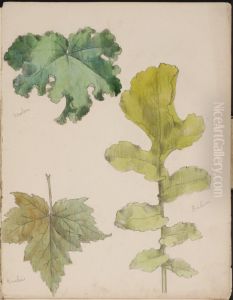Gunnar Gunnarsson Wennerberg Paintings
Gunnar Wennerberg was a multifaceted Swedish figure, whose contributions spanned across music, literature, and politics, making him a notable personality in 19th-century Scandinavia. Born on October 2, 1817, in Lidköping, Västra Götaland county, Wennerberg was not just an artist but also a statesman who left an indelible mark on Swedish culture and political life. His early life was characterized by a profound interest in music and literature, which was nurtured through his education at Uppsala University. It was here that Wennerberg became deeply involved in student life, contributing significantly to the rich cultural traditions of the university.
Wennerberg's most famous literary contribution is 'Gluntarne' (The Lads), a collection of 30 duets for baritone and bass voices that humorously and affectionately depict student life in Uppsala. These songs, first published in the mid-19th century, became immensely popular and are still performed today, serving as a testament to his enduring legacy in Swedish music and culture. Beyond his literary achievements, Wennerberg was also a skilled artist and composer, whose works contributed to the romantic nationalism movement sweeping across Europe at the time.
In addition to his cultural contributions, Wennerberg's career also took a political turn. He served as a member of the Swedish Riksdag, the country's national legislature, and held several key government positions, including that of a Cabinet Minister. Later in life, Wennerberg was appointed as the Governor of Kronoberg County, a role in which he served from 1875 to 1888. His political career was marked by a commitment to public service and the development of Swedish society.
Wennerberg's contributions were not limited to his homeland; he also served as the Swedish-Norwegian ambassador to Denmark, further highlighting his role as a significant figure in Scandinavian politics and culture. Gunnar Wennerberg passed away on August 24, 1901, in Läckö, Västra Götaland county. His death marked the end of a life that had been rich in artistic and political achievements, leaving a legacy that continues to be celebrated in Sweden and beyond. Through his multifaceted career, Wennerberg exemplified the ideal of the 19th-century polymath, contributing to the cultural, political, and social fabric of his time.




